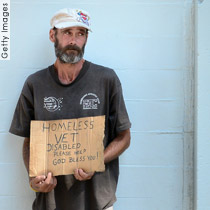
In the coming year, Santa Cruz County will take a new interest in veterans who need a helping hand.
Grabbing the momentum generated during the cooperative effort to house 180 chronically homeless men and women locally, the 180/2020 collaborative initiative, formerly known as 180/180, is zeroing in on housing all local homeless veterans by the end of 2015 through collaboration with a national project. The goal, aimed at an estimated 395 homeless veterans countywide, may need to extend beyond December 2015, but partner agencies say they will continue as long as it takes.
Phil Kramer, director of 180/2020, said as one of 68 participants in the “Zero: 2016” project, the local effort will receive specialized advice from the organization, but not direct funding.
Announcement of 180/2020’s inclusion in the national effort came shortly before Veterans Day, a stark reminder that not all of those who have served their country are receiving the same care.
“I think it’s a great time to reflect on people that have served our country, and decide to make a commitment as a community that it’s unacceptable to have an unsheltered homeless veteran on the street on the streets of Santa Cruz County,” said Kramer. “I think that’s not a very hard thing to decide and to commit ourselves to, doing everything we can in the next year to have every veteran who’s unsheltered put into housing.”
Participation in the national effort comes with assistance in utilizing research results and real-time data, redesign of local systems and leadership development from the nonprofit Zero: 2016 organizer, Community Solutions. Kramer said being part of the larger project also lets 180/2020 tap into a “collective intelligence” and look at shared best practices.
“It’s something we can draw from, that there is a working solution for people that are experiencing chronic homelessness,” Kramer said. “I think that’s a powerful thing and we want to continue to build upon that.”
Zero: 2016 is the successor project to the 100,000 Homes Campaign, during which more than 200 of Santa Cruz County’s chronically homeless people were placed in supportive housing.
Kendra Cooley, lead case manager at the Veterans Resource Center of Santa Cruz County, commended the new focus on homeless veterans.

